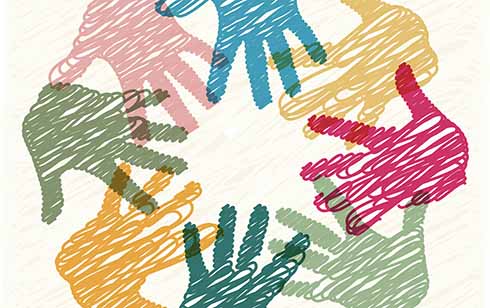 Solidarity is a strong word. It summons up images of striking workers standing hand in hand against police dogs. It is about strong concerted action in the face of your fears.
Solidarity is a strong word. It summons up images of striking workers standing hand in hand against police dogs. It is about strong concerted action in the face of your fears.
Most likely men’s work. My most vivid and moving understanding of solidarity, however, came from a gathering of parish pastoral workers, mostly women, in El Salvador towards the end of the civil war. At that time people in rural areas were terrorised by the armed forces which suspected them of supporting the resistance. Church pastoral leaders were targeted. It was common for men to be dragged away from their houses to military barracks or police stations where they would be disappeared. Friends who came quickly to the barracks could be beaten or worse, but could save people’s lives
At this meeting the pastoral workers were asked to act out on the stage situations which were part of their daily life. In one of these dramas a woman rushed into a group of villagers shouting that the soldiers had snatched their husbands from the village. She then came to the front of the stage asking the audience, ‘Will you come to the barracks to support your men?’ Every woman in the audience immediately got up on the stage to follow her. That was solidarity, holding your ground together to defend others in the face of your fears.
Solidarity begins in the eye and the heart. We notice people, our hearts go out to them and we respond to their needs. Most of us find solidarity in our families and among our friends. We may fight among ourselves, but if someone is beating up our little brother we rush to his defence. He is family. Human solidarity goes further than this. It leads us to see even strangers as family because we share with them a common humanity. Instead of separating family and friends from strangers, and seeing strangers as invaders, rivals or as none of our business, our hearts and hands reach out to strangers in need.
The test of a good society is how far solidarity reaches. Where it does not exist, people take no interest in people outside their immediate family and town, see other people as strangers or invaders, and are resentful when they receive attention or help. People can hear of and watch the suffering of strangers without being moved or still less doing anything to help them. Lack of solidarity breeds apathy or resentment. Solidarity brings people together to support others when they are in need or are treated badly. Our ministry at Jesuit Social Services is built on solidarity with the people whom we accompany. We try to meet them with open hearts, as our brothers and sisters.
World Migrants Day (18 December), which occurs two days before International Human Solidarity Day (20 December), reminds us that a crucial test of solidarity of today’s society lies in the welcome given to migrants and refugees. They are always likely to be seen as strangers, to be resented for stealing jobs, and regarded as lesser because they are different. A society that welcomes migrants cheerfully and generously is to be celebrated. Australia, in which most people are immigrants or are descended from them should be particularly welcoming of other people.